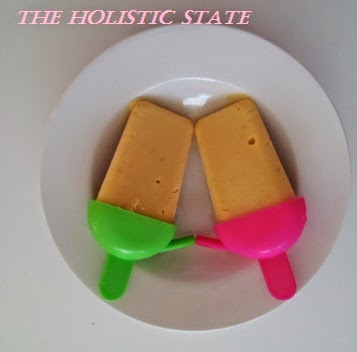(Gluten Free, Raw, Vegan, Sugar Free)
This clean dessert is ridiculously easy to make! It only
contains three ingredients and is so sweet and creamy that you will struggle to
believe it is dairy-free and contains no added sugar.
Although this dessert does contain coconut cream (in a
relatively small amount), which is high in saturated fat (Nogrady, 2008), I
still consider the recipe to be clean as it does not contain any animal
products, added artificial flavours/preservatives/colours,
gluten or added salt or sugar, therefore, I believe, making it a healthier
choice than conventional supermarket ice-creams.
Serves: 9 (makes
about 9 ice blocks)
Ingredients:
- 1 slightly over ripe
banana (if the banana is too ripe it may overpower the other flavours)
- 2 cups of frozen,
diced mango
- 1/2 a cup of coconut
cream (mine was 75% coconut extract)
Method:
1. Place the banana, mango and coconut cream in a blender and
blend until smooth.
2. Pour ingredients in to ice block mould and insert the ice
block sticks.
3. Gently and carefully, tap the moulds on the bench to remove
any air bubbles in the mixture.
4. Place moulds in freezer, on a flat surface, over night or
for at least 8 hours.
5. When you are sure that your ice blocks are fully frozen,
gently run the moulds under warm water before gently easing them out of the
moulds.
HINTS:
- You can always play around with the ratio of the ingredients
until it is to your liking.
- I purchased my ice block moulds from Kmart for around $4
- If the treats don’t release easily, run them under the warm
water again until they loosen. Trying to force them out could result in the
stick become dislodged from the ice block, therefore making it not only hard to
remove, but also difficult to eat!
Nutritional Benefits
Banana:
-Potassium- ‘an
essential mineral for maintaining normal blood pressure and heart function.’
- Small amounts of ‘sterols’
such as ‘sitosterol, campesterol, and stigmasterol’: ‘can block the
absorption of dietary cholesterol.’
- Soluble fiber: ‘associated
with decreased risk of heart disease.’
- Low GI
- Support digestive
health: ‘FOS are unique fructose-containing carbohydrates that are
typically not broken down by enzymes in our digestive tract. Instead, they move
along through the digestive tract until they reach our lower intestine and get
metabolized by bacteria. This process helps maintain the balance of
"friendly" bacteria (for example, Bifidobacteria) in our lower
intestine, and as a consequence, it also supports our overall digestive health.’
(The George Mateljan
Foundation, Nd)
Mango:
Mangoes are ‘low fat, saturated fat free, sodium free,
cholesterol free, high in vitamin A’ and a ‘good source of vitamin c’ (Produce
for Better Health Foundation, N.d).
References
1. The George Mateljan Foundation, N.d. Bananas. Retrieved 28th
of May, 2014 from http://whfoods.org/genpage.php?tname=foodspice&dbid=7
2. Nogrady, B. (2014). The Pulse: Coconut: Good fat or bad?
Retrieved 28th May, 2014 from http://www.abc.net.au/health/thepulse/stories/2008/09/25/2372372.htm
3. Produce for Better Health Foundation. (N.d). Mango.
Nutrition. Selection. Storage. Retrieved 28th May, 2014 from http://www.fruitsandveggiesmorematters.org/mango


No comments:
Post a Comment